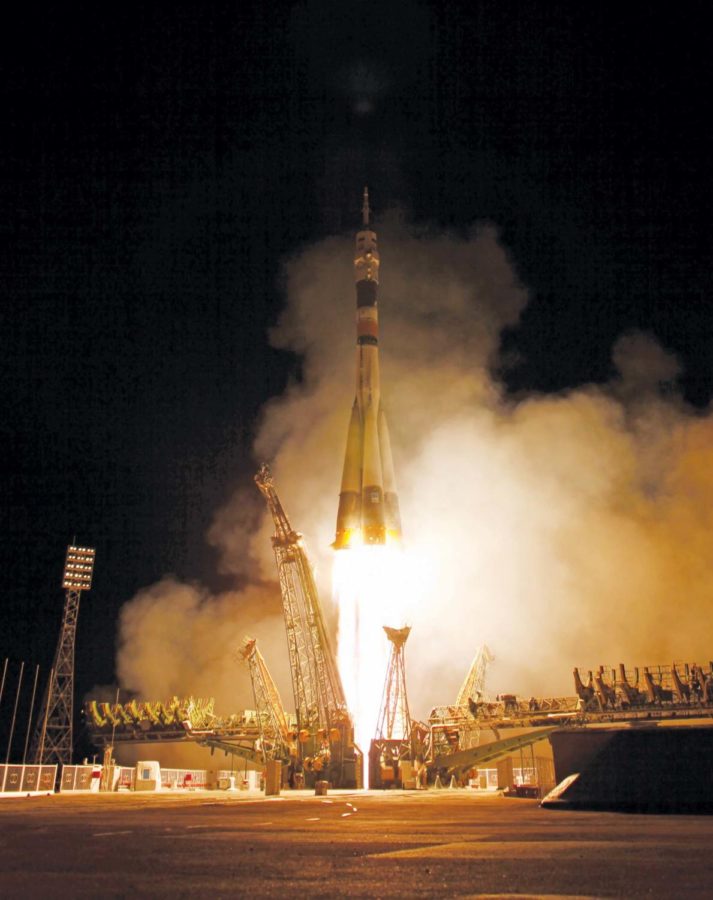Hanton: Support innovation by supporting failure
October 16, 2011
“Beep beep beep … beep beep beep.”
Just 54 years ago this month, Sputnik beeped out a tune to millions of humans from miles above their heads. It forever changed the future of the earth and human technology — proving to people around the world that the sky was not the limit and allowing us to develop new technologies that would forever change the world.
But I’m sure many of you share the sentiment of Homer Hickam’s friend Jimmy O’Dell in the movie “October Sky”: “Well, big deal … ” What could a hunk of metal flying around the earth at 5 miles per second have to do with me down here?
Well, during most of the years of our parents’ lives, we have become increasingly sophisticated at launching payloads into space and have become increasingly dependent on spacecraft for our daily needs.
Every morning you wake up and walk out the door, knowing whether to bring sunscreen or an umbrella, in part thanks to weather satellites orbiting high above the earth. When you drive somewhere new, your GPS computer uses 24 satellites orbiting above Earth to tell you exactly where you are and where to go. If you need to place a call around the Earth, it will likely bounce off a few satellites in between you and your destination. When you see the evening news or breaking news, some of the best reporting is likely done on location and broadcasted back to the station using a satellite up-link truck.
And those are just the visible benefits of space exploration.
One of the best things about America is not our people, it isn’t our liberty or our laws — it’s our culture that encourages new innovation. And I worry that we’re becoming too risk-averse, that we’re losing the innovative spirit that helped us invent everything from the cotton gin to the assembly line to the liquid-powered rocket.
Even NASA, an agency tasked with exploring the heavens and going where no man has gone before has been encouraged by congressmen and women to play it safe and cheap and not push too many boundaries. While even NASA officials acknowledge the need to try to use newer and cheaper methods to achieve their goals, many congresspeople want our space agency to keep paying large defense conglomerates for their 50-year-old families of rockets, at a multi-million dollar premium over their cheaper, younger cousins.
I have expressed my belief — to you in this paper, and to congresspeople in committee — that NASA’s path in the future should include equal support of both new upstart space companies and 100-year-old behemoths. As it currently stands, most of the money NASA has provided to develop new rockets has gone to the old guard, while a comparatively small portion has gone to upstarts like SpaceX.
But it is still a difficult game to play because the U.S. public will not accept a failure that kills astronauts, be they civilian or government employees. Such non-acceptance of failure makes this an impossible game to play, but yet America has generated a dozen new space companies in just the last decade.
A former ISU student and friend of mine, Ben Brockert, who has worked for a few small space companies in the last five years, has many times explained to young students the importance of failure. In almost any field, if you are developing something exciting and new, you will fail many times before you finally succeed. But during the same decades that the United States has experienced amazing growth based on technological developments, we have grown increasingly risk-averse.
There is a laundry list of projects that the United States has dreamed up, started and then stopped paying for because companies and senators failed to see the long-term scientific benefits as an advantage when compared to the cost. We canceled projects like the Superconducting Super Collider (SSC) in Texas (1993), the NASA Constellation program (2010), and may cancel the new James Webb Space Telescope halfway through development.
In an age when we couldn’t budget enough money toward long-term programs to stop NASA from being dependent on Russia for launching astronauts, we need to stop and examine our priorities. Do we stay on the same path, not looking out for future priorities, but budgeting for only today? Not funding science because we are too focused on fighting terrorists around the world?
We need to focus the money of the federal government and our priorities in specific areas to keep on track and achieve a few chosen goals. To some extent, the tea party supporters are right, we are spreading ourselves too thin and counting on the government to take care of too many things at once. We should focus in on innovation, the foundation of America and support the scientific discoveries that engender innovation in our national policy.
We may not win every war we fight, but the last time we sent men out of our atmosphere, we started a decades-long technology revolution. Do we want to relate to the other citizens of the world as a violent global police force or as a peaceful spacefaring nation? Do we take risks, make mistakes and develop innovations or outsource innovation just like everything else? It is up to you to decide.







